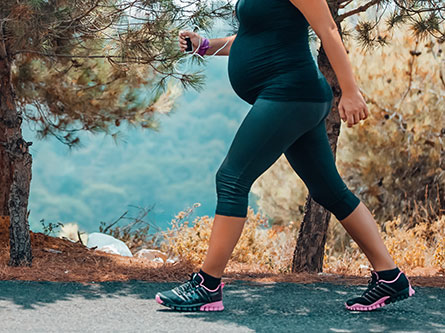Exercise is an important part of health for any stage in life, and that includes pregnancy. Experts used to recommend avoiding much exercise during pregnancy, but that has changed. New research shows there are benefits to exercise for both mother and developing baby.
Typically, once a health care provider confirms you're pregnant, they will also encourage you to stay active. That level of activity may look different for each expectant mother.
Our OB-GYN providers explain what exercises are safe for you and your baby and share how staying active can help keep everyone healthy. The bottom line is that it's important to listen to your body.
Explore how our OB-GYN program offers personalized pregnancy care
What exercises are safe during pregnancy?
OB-GYN providers recommend 150 minutes of moderate activity each week during pregnancy. Typically, you can continue doing whatever sorts of exercise you were doing before you got pregnant. If you weren't physically active before pregnancy, it's recommended that you start walking several times a week.
Exercises and activities that are great during pregnancy include:
- Walking
- Swimming and water classes/exercises
- Stationary bicycling
- Pilates and yoga
- Stretching
- Running or jogging, if you were doing these before you were pregnant
- Racquet sports, if you were doing these before you were pregnant
It can be helpful to stretch and warm up for at least five minutes before exercising. Later in pregnancy, consider modifying or shortening workouts as you may get tired more quickly. Talk with your health care provider about your physical activity and what's safe for you.
Learn more about pregnancy health and nutrition
Schedule an appointment with our OB-GYN providers
What exercises should you avoid during pregnancy?
It's recommended that you avoid any hot classes, such as hot pilates and hot yoga. Much like pregnant mothers should avoid saunas and hot tubs, the same principles apply to hot exercise. Experts don't know how high body temperatures get during these activities.
You should also avoid any contact sports where there's a risk of being hit or falling, such as kickboxing and soccer. You should also avoid:
- Skydiving
- Outdoor bicycling
- Horseback riding
- Snow skiing
- Water skiing
- Scuba diving
Later in pregnancy, you may want to avoid exercises and activities that require more balance and coordination.
Check out these 10 foods to eat and avoid during pregnancy
How does exercise affect pregnancy?
Exercise during pregnancy can have many positive effects on the health of you and your developing baby, as well as the delivery itself. According to a 2023 study publish in the National Institute of Health, exercise in pregnancy has been shown to decrease the following:
- Macrosomia (babies born much larger than average)
- Gestational diabetes (diabetes during pregnancy)
- Preeclampsia (high blood pressure in women after 20 weeks of pregnancy)
- Cesarean delivery (known as C-section, a surgical delivery of the baby through an incision in the mother's abdomen and uterus)
- Low back pain
- Urinary incontinence (trouble controlling your bladder)
It can also help with healthy weight gain during pregnancy and help you lose weight after you give birth.
Inactivity during pregnancy can lead to obesity, which comes with many health risks for both the developing baby and the mother. Inactivity can also increase the risk of deep vein thrombosis, which can be life-threatening.
Sign up for our Health Highlights e-newsletter
Can you do squats and lift weights during pregnancy?
Squats are a great way to keep your muscles strong and give added range of motion to your lower body. They can help improve posture and can make birthing a little easier. You can get the benefits of squats with or without using weights.
See 5 ways to perform squats safely during pregnancy
If you were training with heavy weights before pregnancy, you should be able to continue doing so. However, as your belly gets bigger, your center of gravity changes. Keep that in mind as you're performing any exercise, but especially those with weights. You want to stay controlled and slow in your movements.
Check out our childbirth and breastfeeding classes
Is it safe to exercise during the third trimester of pregnancy?
During the third trimester of pregnancy (28-42 weeks), exercise is still recommended for most expecting mothers. It can help relieve some discomfort that comes with this stage of pregnancy. As with any stage of pregnancy, listen to your body. If you feel dizzy, out of breath or have pain in your back or pelvis, stop your workout.
Some good exercises during the third trimester include yoga, pilates, walking and swimming. Pelvic floor exercises, called Kegel exercises, can help you during and after giving birth. Pelvic floor muscles support organs like your bladder, bowel and vagina. To do Kegels, tighten then release muscles in your pelvic floor, like you're trying to stop urinating.
Learn about our birthing suites and maternity services
Is strenuous exercise safe during pregnancy?
For those who are high-performance athletes, it's typically fine to continue your normal exercise routine – as long as you don't have complications. Athletic women can push through fatigue but be sure not to push yourself too hard because it can affect your developing baby. You should talk to your OB-GYN about what's safe for you.
How soon after giving birth can you return to exercise?
If you had a normal vaginal delivery and were healthy during pregnancy, you can start exercising soon after your baby is born. This could be as soon as a few days after giving birth. You may want to start slow, with an activity like walking or yoga.
If you had a C-section or other complications during pregnancy, talk to your OB-GYN about when you can exercise.
Explore our maternity classes for expecting parents
This blog was medically reviewed by OB-GYN provider Anne Flynn.




